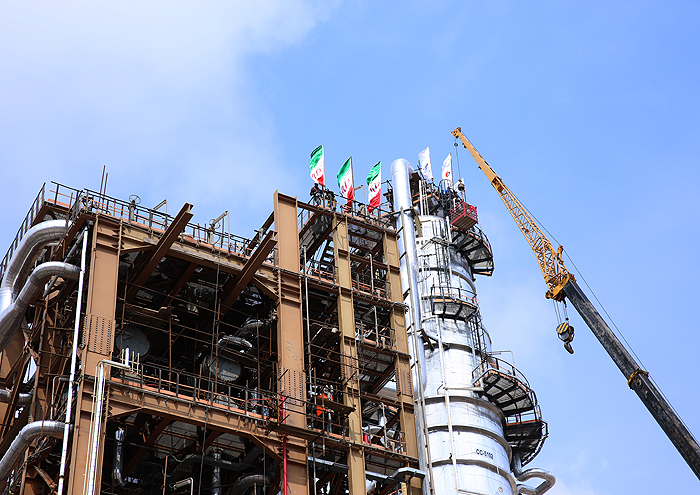The refinery is now producing 12 million liters a day of Euro-5 gasoline. From now onwards, it will be running at full capacity of first phase. Due to some restrictions and problems, Phase 1 had not become operational. However, thanks to its managers and specialists' efforts the project came online.
Mohammad-Ali Dadvar, CEO of the refinery, told reporters that the facility was also producing 3.4 ml/d of gasoil and 500,000 l/d of liquefied petroleum gas (LPG).
He said that four cargoes of sour naphtha produced at this refinery were exported in the last calendar year to March 2017. He added that two 35,000-tonne sour naphtha would be exported soon.
The Bandar Abbas condensate refinery is the most modernized refinery in the Middle East. It was designed in the form of three trains with a daily capacity of treating 360,000 barrels of gas condensate supplied by the gas refineries of South Pars gas field to produce 36 ml/d of gasoline.
Dadvar said the costs needed for completing remaining phases of this refinery would be covered by selling products or by getting credit from the National Development Fund of Iran (NDFI).
So far, 3.859 million Euros has been spent on the project while the remaining two phases are estimated to need 240 million Euros.
Reduction of environmental pollution and national self-sufficiency in the supply of petroleum products are the most important achievements of the refinery which Dadvar said was designed based on Euro-4 standards.
"Soon we will be able to produce Euro-5 gasoil in addition to Euro-5 gasoline," he said.
Dadvar said the refinery products have a sulfur content of less than 2 ppm and they all comply with Euro-5 standards.
Dadvar said the refinery would convert gas condensate into valuable products like gasoline, gasoil and jet fuel to make the country self-sufficient in this regard.
He said that more than 100 million liters of Euro-5 gasoline produced at this refinery had been delivered to the National Iranian Oil Products Distribution Company (NIOPDC) in early January. He added that 1.5 liters of Octane-87 gasoline had so far been produced at this facility.
Catalyst Indigenized
Dadvar said a pipeline carrying condensate to the refinery had a capacity of 360,000 b/d, which could increase to 500,000 b/d.
"One station pumps gas condensate to this refinery through four electropumps, each having capacity to pump 12,500 cubic meters per hour at 90 Bar pressure," he said.
Dadvar said France's Axens was the main designer of the refinery, adding that an Iranian company was supplying catalyst to the refinery. "In addition to self-sufficiency and domestic manufacturing of foreign products, it has been cost-effective for us," he said.
Dadvar said the refinery had not yet received any warning over environmental pollution. "In order to prevent the refinery's contaminated wastes from flowing into sea a five-hectare-long pool has been arranged to collect wastes and balance the water temperature returning it into sea," he added.
The condensate refinery has been designed in three phases, each with a capacity of 120,000 b/d of gas condensate. This refinery contains 30 operating units (20 processing and 10 utility units). Nine processing units are for Phase 1, eight for Phase 2 and three for Phase 3.
€260mn Loan
Ali-Reza Sadeq-Abadi, deputy minister of petroleum for refining affairs, recently said that the NDFI had agreed to offer €260 million in loan for the completion of the Bandar Abbas condensate refinery.
He said that the refinery was running at one-third of its capacity, adding that it is expected to become fully operational by March 2019.
Sadeq-Abadi said that the Bandar Abbas condensate refinery and Bandar Abbas oil refinery were producing a total of 50% of Iran's gasoline.
He added that no budget would be allocated for gasoline imports next calendar year which starts in March 2018. "Therefore, we need to become an exporter of gasoline as soon as possible."
Courtesy of Iran Petroleum


Your Comment